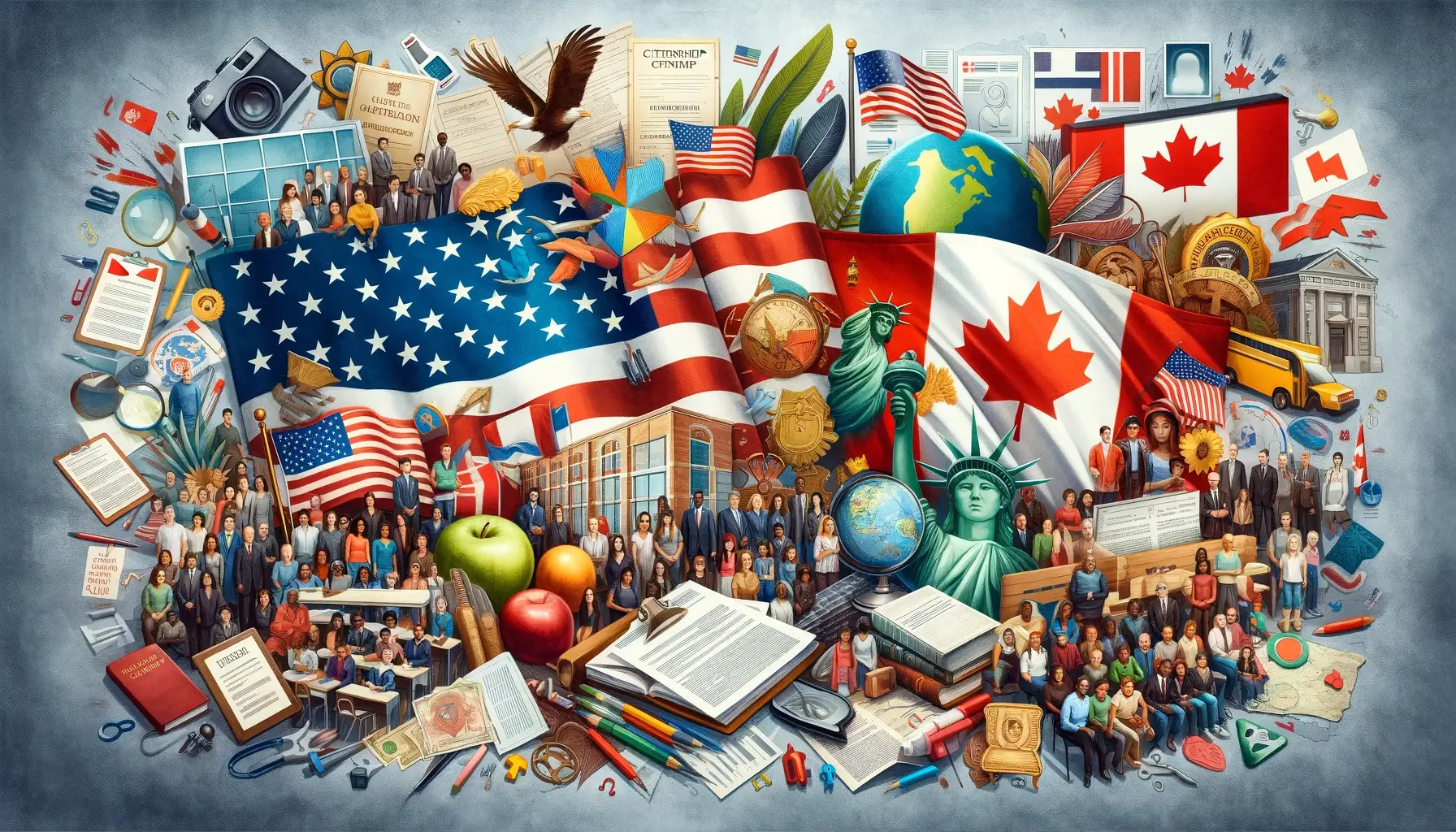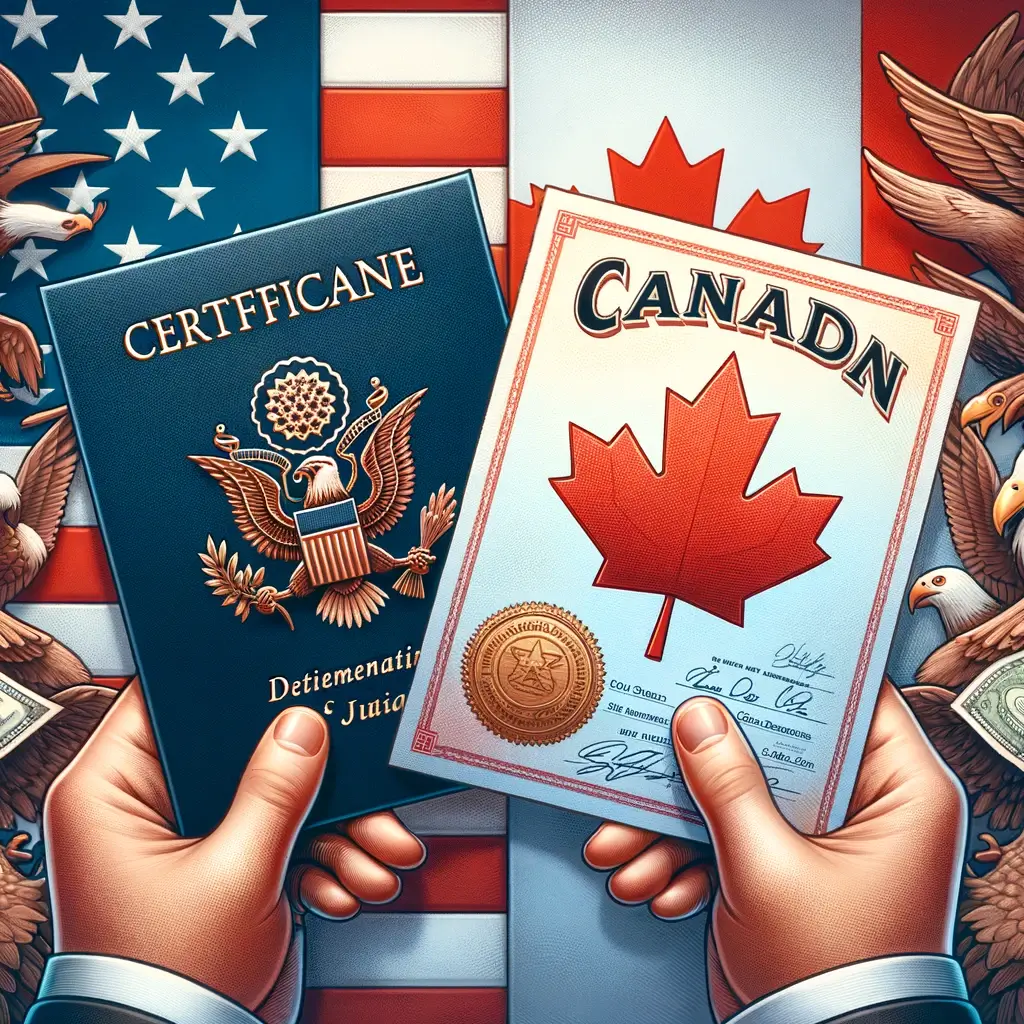Benefits of Dual Citizenship: Embracing a Global Identity in Canada
Your Quick 30-Second Answer!
The Benefits of Dual Citizenship are significant, offering individuals the privilege of holding multiple nationalities simultaneously, granting access to rights and privileges in both nations, including the freedom to travel without visa restrictions, own property in both countries, and participate in voting rights in elections of each nation. Dual citizenship provides access to essential social services, healthcare, and education in both countries, opens doors to career opportunities without the need for work permits, and extends benefits to family members with diverse nationalities. It also enhances security and safety options during times of instability or crises, allowing individuals to seek refuge or assistance from either nation. Additionally, dual citizenship fosters a strong sense of cultural and personal identity, preserving connections to cultural heritage and a sense of belonging to both countries. It's crucial to consider that the specific benefits of dual citizenship may vary depending on the countries involved and their respective laws, necessitating consultation with legal and immigration experts for a tailored understanding of the advantages specific to one's circumstances.
For an in-depth overview, please see the "Table of Contents" below.
Legal and Cultural Benefits of Dual Citizenship in Canada
Welcome to this guide on benefits of dual citizenship. Discover the enriching journey and manifold advantages of holding dual citizenship in Canada, where a world of opportunities and a blend of cultures await you.
Table of Content
Foundations and Legalities
1. Understanding Dual Citizenship
2. Legal and Immigration Aspects
3. Legal Considerations and Challenges
Economic, Professional Advantages
4. Economic Benefits of Dual Citizenship
5. Education and Employment Opportunities
Social and Cultural Integration
6. Social and Cultural Benefits
7. Life in Canada as a Dual Citizen
Practicalities and Mobility
8. Travel and Global Mobility
9. Application Process Dual Citizenship
Resources and Assistance
10. Common Questions (FAQs)
11. Where to Find Resources

1. Understanding Dual Citizenship in Canada
Dual citizenship, a status where an individual is legally recognized as a citizen of two countries, offers a myriad of advantages. Canada, known for its welcoming stance on immigrants and diverse culture, allows dual citizenship, making it a prime destination for those seeking the benefits of belonging to more than one nation. This guide delves into the myriad benefits of dual citizenship in Canada, targeting individuals aiming to understand the immigration process in this beautiful country.
Dual Nationality and Second Citizenship
Canada's policies embrace the concept of dual nationality, offering a chance for individuals to enjoy the privileges of Canadian citizenship while retaining their connection to their country of origin. This includes the ability to travel freely between the two countries, access social services, and maintain cultural ties. For many, this means holding a Canadian passport along with their native one, providing unparalleled global mobility.
Legal Status of Dual Nationals in Canada
Dual nationals in Canada are recognized as full Canadian citizens. This status grants them the same rights and responsibilities as natural-born citizens, including the right to vote in federal elections and the opportunity to hold public office. Understanding the legal implications of dual citizenship is crucial, especially for those considering application processes like Form N-400 for U.S. citizens looking to obtain Canadian citizenship.
Benefits of Dual Citizenship
1. Multiple Nationalities: Dual citizenship, also known as dual nationality, allows an individual to hold citizenship in two countries simultaneously. This status provides access to the rights and privileges of both nations.
2. Freedom to Travel: Dual citizens enjoy the freedom to travel between their two countries of citizenship with ease. They can enter and exit these countries without the need for visas or residence permits, making international travel more convenient.
3. Property Ownership: Dual citizenship may enable individuals to own property in both of their countries of citizenship. This can be advantageous for investment purposes or for maintaining a residence in each country.
4. Voting Rights: Dual citizens often have the right to vote in the elections of both countries. This allows them to participate in the political processes of each nation and have a say in their governance.
5. Access to Social Services: Dual citizens may be eligible for social services, healthcare, and education in both countries. This can enhance their access to public benefits and services.
6. Career Opportunities: Dual citizenship can open up career opportunities in both countries, as individuals can work without the need for work permits or visas. This can be especially beneficial for those seeking international employment.
7. Family Benefits: Dual citizenship can extend to family members, providing them with similar rights and privileges. This can be particularly advantageous for families with diverse nationalities, ensuring that all family members enjoy the benefits of citizenship in both countries.
8. Security and Safety: In times of political instability, natural disasters, or emergencies, dual citizens may have the option to seek refuge or assistance from either of their countries. This added security can provide peace of mind.
9. Cultural and Personal Identity: Dual citizens often maintain strong connections to their cultural heritage and enjoy a sense of belonging to both countries. This dual cultural identity can enrich their personal lives.
It's important to note that the specific benefits of dual citizenship can vary depending on the countries involved and their respective laws and regulations. Individuals considering dual citizenship should consult with legal and immigration experts to understand the implications and advantages specific to their situation.
2. Legal and Immigration Aspects of Dual Citizenship

The Naturalization Process
The journey to becoming a dual citizen in Canada often involves the naturalization process. This process requires applicants to meet specific eligibility requirements, which may include a period as a permanent resident, demonstrating language proficiency in English or French, and knowledge of Canadian social norms and history.
Eligibility Requirements for Canadian Citizenship
Understanding the eligibility requirements is crucial for prospective dual citizens. This includes criteria like the number of days spent in Canada as a permanent resident, age, language skills, and passing a citizenship test. Immigrants, including green card holders in the U.S., must carefully navigate these requirements to achieve dual citizenship status.
The Canada citizenship language requirement is a critical component of the citizenship application process. All permanent residents (PRs) aspiring to become Canadian citizens must undergo the naturalization process, which includes proving their English language proficiency. This requirement also applies to those seeking dual citizenship.
3. Legal Considerations and Challenges

Navigating Dual Citizenship Rules and Taxation
Dual citizens must navigate the laws of both countries, including understanding dual citizenship rules and tax obligations. Issues like double taxation can be complex, but income tax treaties between Canada and other countries often provide clarity. An immigration lawyer can provide invaluable assistance in these matters.
Mandatory Military Service and Oath of Allegiance
Some countries require mandatory military service or a specific oath of allegiance that may conflict with Canadian laws. It's important for dual citizens, such as those holding U.S. citizenship or Australian citizenship, to understand these obligations to comply with the laws of both countries.
4. Economic Benefits of Dual Citizenship in Canada
Business Opportunities for Dual Citizens
Canada's robust economy offers numerous business opportunities for dual citizens. These individuals can leverage their status to start businesses, invest in Canadian markets, or engage in international trade more efficiently, benefiting from the economic policies of both their home country and Canada.
Investment Programs and Foreign Investors
Canada's investment programs are particularly attractive to dual citizens. These programs often offer incentives for foreign country investors, including those with dual citizenship, to invest in the Canadian economy, particularly in sectors like real estate and technology.
Government Bonds and Economic Security
Investing in government bonds is another avenue where dual citizens can benefit. These investments are often seen as a secure way to contribute to and benefit from Canada's economic growth, providing a stable financial future for the investors and their families.
Property and Land Ownership Rights
One of the most tangible benefits of dual citizenship in Canada is the ability to own property in both countries. This not only provides financial security but also offers a sense of belonging and a base in both nations. Whether it's owning a residence, vacation home, or investment property, dual citizens have an upper hand in the real estate market.
5. Education and Employment Opportunities

Access to Higher Education
Dual citizenship significantly enhances access to higher education. Canadian citizens benefit from subsidized tuition fees at universities, which is a boon for students holding dual citizenship. This aspect is particularly appealing for families who value education and wish to provide the best opportunities for future generations.
Employment Opportunities in Canada and Abroad
Employment opportunities expand with dual citizenship. Having the legal status to work in different countries without the need for a work visa is a significant advantage. This is especially true for professions that require international travel or work with international companies.
6. Social and Cultural Benefits

Social Benefits and Family Ties
Dual citizenship in Canada allows individuals to enjoy social benefits in both countries. This can include healthcare, social services, and retirement benefits. Moreover, it enables people to maintain strong family ties and cultural connections, which is vital for many who have their family history rooted in another country.
Maintaining Connections with the Home Country
For individuals who are natural-born Filipinos, Italian citizens, or citizens of another country, dual citizenship allows them to maintain a legal and cultural connection with their country of origin. This is particularly relevant for those who want to own land or property in their home country while enjoying the benefits of Canadian citizenship.
7. Life in Canada as a Dual Citizen

Experiencing the Best of Both Worlds
Dual citizenship offers a unique opportunity to experience the best of both worlds. Whether it’s for work, study, or family reasons, being a citizen of the United States and Canada, for example, provides a wealth of opportunities and a safety net that is unparalleled.
Building a Future for the Next Generation
Dual citizenship is not just about the present but also about securing opportunities for future generations. It allows families to pass down the richness of two cultures, expand their horizons, and provide a more secure and diverse future for their children.
8. Travel and Global Mobility

Enhanced Global Mobility with a Second Passport
Holding a Canadian passport, recognized globally for its travel freedom, alongside another passport, such as a U.S. passport or an EU citizenship passport (European Union), significantly eases international travel. This is ideal for frequent travelers, business people, and those with family members in different countries.
The Right of Entry and Security Clearance
The right of entry is a major benefit for dual citizens, especially in times of geopolitical unrest or personal emergencies. Additionally, dual citizens often find it easier to obtain security clearance for work in certain sectors, enhancing their employability in a global context.
9. The Application Process for Canadian Dual Citizenship

Step-by-Step Guide to Citizenship Application
The application process for obtaining Canadian dual citizenship involves several steps, including submitting necessary documents like birth certificates and undergoing a citizenship test. This process varies slightly for different groups, such as Mexican citizens, American citizens, or EU citizens.
Documentation and Legal Considerations
Gathering the correct documentation, including foreign citizenship papers and Canadian immigration forms, is crucial. The process can be complex, especially for foreign diplomats or those with security concerns, making the guidance of an immigration lawyer invaluable.
Final Words
In exploring the benefits of dual citizenship, particularly in the Canadian context, we've navigated a landscape rich with opportunities and responsibilities. Whether you're a foreign national considering Canadian dual citizenship, a green card holder weighing the advantages of US citizenship alongside Canadian rights, or an EU citizen exploring the expansiveness of Italian dual citizenship, the journey is unique and rewarding.
For many, the concept of dual citizenship is more than a legal status; it's a bridge between cultures, economies, and personal histories. It offers Italian, American, and Australian citizens, among others, a chance to expand their horizons beyond their home country or the country of their birth. Holding an Italian passport, an American passport, or a U.S. passport while also being a legal citizen of Canada opens doors to global mobility, federal jobs, and enhanced consular protection.
This dual status addresses the practicalities of life in a globalized world, from easing work permit requirements to simplifying tax purposes and offering tuition assistance for domestic students. It's a pathway not just for the naturalized citizen or the student on a visa, but also for those seeking to invest in foreign securities, work in international companies, or simply live a life enriched by multiple cultures.
As we've seen, the benefits of dual citizenship extend into every facet of life. From the security of having legal status in more than one country to the everyday conveniences of travel and education, dual citizens in Canada enjoy a range of privileges. They navigate between their host country and country of origin, sometimes paying taxes in the U.S., sometimes participating in the political life of New Zealand, or contributing to the cultural tapestry of their community in Canada.
For those who have previously encountered challenges as citizens of another country, dual citizenship offers a solution and a safety net. It's a commitment to living a life unbounded by the geographical and cultural limits of a single nation. Whether you're mastering basic English to fulfill Canadian immigration services requirements or leveraging your status for professional growth, the benefit of dual citizenship is clear and multifaceted.
In essence, dual citizenship in Canada is not just about holding passports from different countries. It's about embracing the full spectrum of experiences, responsibilities, and opportunities that come with being a citizen of another country. It's a journey of discovery, a testament to our interconnected world, and a privilege that offers immeasurable benefits of dual citizenship.
10. Common Questions (FAQs) about Benefits of Dual Citizenship

What Are the Benefits of Dual Citizenship?
What Are the Benefits of Dual Citizenship?
Dual citizenship offers global mobility, access to social services in both countries, diverse employment opportunities, and cultural enrichment from belonging to two nations.
Can Dual Citizens Work in Both Countries Without a Work Visa?
Can Dual Citizens Work in Both Countries Without a Work Visa?
Yes, dual citizens can work in both countries without needing a work visa, simplifying the employment process significantly.
How Does Dual Citizenship Affect Travel?
How Does Dual Citizenship Affect Travel?
Dual citizens enjoy ease of travel between their countries and potentially others, depending on visa agreements, thus enhancing global mobility.
Are There Tax Implications for Dual Citizens?
Are There Tax Implications for Dual Citizens?
Dual citizens may be subject to taxation in both countries. Understanding each country's tax laws is essential to avoid double taxation.
Can Dual Citizens Own Property in Both Countries?
Can Dual Citizens Own Property in Both Countries?
Yes, dual citizenship usually allows individuals to own property in both countries, providing investment flexibility and personal convenience.
How Does Dual Citizenship Impact Education Opportunities?
How Does Dual Citizenship Impact Education Opportunities?
Dual citizenship provides access to educational systems and potential tuition benefits in both countries, broadening academic and professional prospects.
What Are the Security Benefits of Dual Citizenship?
What Are the Security Benefits of Dual Citizenship?
Dual citizenship can offer increased security in times of political or economic instability, providing an option to reside in either country.
How Does Dual Citizenship Affect Nationality Status for Children?
How Does Dual Citizenship Affect Nationality Status for Children?
Children of dual citizens may inherit the dual status, depending on the nationality laws of the respective countries.
Can Dual Citizens Vote in Both Countries?
Can Dual Citizens Vote in Both Countries?
This varies by country, but generally, dual citizens can vote in both countries if they meet each country's voting requirements.
What Is the Process of Applying for Dual Citizenship?
What Is the Process of Applying for Dual Citizenship?
The application process varies by country and typically involves residency requirements, legal documentation, and sometimes language proficiency tests.
These FAQs provide further clarity on various benefits of dual citizenship. Always refer to official guidelines and consult with immigration experts for the most accurate and up-to-date information tailored to your specific situation.
11. Where to Find Resources
To stay updated with the latest rules and regulations, application processes, forms, and other details related to 'Naturalization vs Citizenship', consider visiting these government websites:

Kamal Akhtar is a Canadian immigration lawyer licensed by the Law Society of Ontario. Based in Ontario, Canada. Kamal has years of experience helping foreign nationals with immigration applications and appeals. He specializes in Canadian immigration law and other complex entry solutions. Kamal dedicates himself to delivering honest, strategic, and client-centered legal solutions for every case.
Kamal's credentials include a Bachelor of Law (LL.B.) and a Master of Law (LL.M.) from Osgoode Hall Law School in Toronto. Kamal is a noted member of professional associations like the Canadian Immigration Lawyers Association (CILA), the Canadian Association of Professional Immigration Consultants (CAPIC), the Canadian Bar Association (CBA), and the Ontario Bar Association (OBA). Over 20 years of legal experience shape Kamal's insights.
Please note that the information provided on this website does not constitute legal or professional advice.
Phone: +1 (289) 216-4666 | Fax: +1 (289) 778-4745 | Email: info@kamallaw.ca



